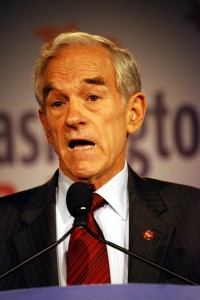Anyone who has studied Ron Paul’s politics would know that he is a staunch proponent of competing currencies and that he opposes fiat money. His real alternative to government-backed currency, though, is gold and silver. Therefore, it may not surprise some that the author of “End the Fed” doesn’t think bitcoin is real money.
The former Texas Republican Congressman and three-time presidential candidate fielded questions on the question-and-answer website Quora on Wednesday. During this time, he was asked about bitcoin in which he responded that he supports the initiative of the virtual currency and concludes that it should be legal, but he doesn’t think it’s a genuine alternative.
“Though I don’t personally believe that Bitcoin is true money, it should be perfectly legal and there should be no restrictions on it, there should be no taxes on it,” Paul wrote. “The people who operate Bitcoin would, of course, be prohibited from committing fraud but the people should be able to have competition whether it is a basket of commodities or crypto-currencies – it should be perfectly legal.”

It should be noted that we reported on a Federal Reserve official who made the same argument: any competing currency would be a good thing in the end because it would prompt the central bank to enhance monetary policy.
According to the founder of Campaign for Liberty, the digital currency is an “interesting subject” and defended competing currencies throughout his time in Washington. The government counterfeits money and devalues the greenback, says Paul, and officials should permit the American people to use any alternative to the dollar they wish.
“That means that anything that wants to substitute for the American dollar should be permitted,” stated Paul. “There should be no prohibitions; there should not be a monopoly and a cartel running our monetary system because it so often benefits the privileged few. Bitcoin is an introduction to that.”
He concluded on the matter by stating that the future of bitcoin requires the government to refrain itself from intervening on the Internet – there have been legislative endeavors to restrict the Internet.
“The internet is the salvation for those of us who believe in liberty because it is an alternative way of getting around the system not only in the spreading of our ideas in this instance but in in terms of getting around the monetary system on the whole if they do permit crypto-currencies and other forms of transactions. So, this is something that we should all be concerned about whether we endorse it or not,” Paul wrote.
Late last year, the author of “Liberty Defined” and “The Revolution: A Manifesto” made headlines when he proclaimed that bitcoin could “destroy the dollar” in the future. However, he had made reservations previously regarding the cryptocurrency by espousing that if he “can’t put it in my pocket, I have some reservations about that.”
Paul continues to promote the Austrian Economics theory of competing currencies. Many economists from this school of economies, including Murray N. Rothbard and Friedrich Hayek, discussed the concept in detail and made the point that consumers should have the right to utilize an alternative currency.
“If people love and will cling to their dollars or francs, then there is only one way to separate money from the state, to truly denationalize a nation’s money. And that is to denationalize the dollar (or the mark or franc) itself. Only privatization of the dollar can end the government’s inflationary dominance of the nation’s money supply,” wrote Rothbard in “The Case for a Genuine Gold Dollar.”
“How, then, can the dollar be privatized or denationalized? Obviously not by making counterfeiting legal. There is only one way: to link the dollar once again to a useful market commodity. Only by changing the definition of the dollar from fiat paper tickets issued by the government to a unit of weight of some market commodity, can the function of issuing money be permanently and totally shifted from government to private hands.”
Another position could be that if the Fed and the federal government have strong confidence in the greenback then there wouldn’t be any concern that it would get eviscerated by any opposing force in the marketplace.
However, as we have reported and analyzed in the past, there have been detractors in the economic field, including Nobel Laureate and Chicago economist Milton Friedman, who presented the case during the 1970s and 1980s that a market of competing currencies would never flourish because it would incite confusion, there would never be a stable currency and the volatility would be immense.




